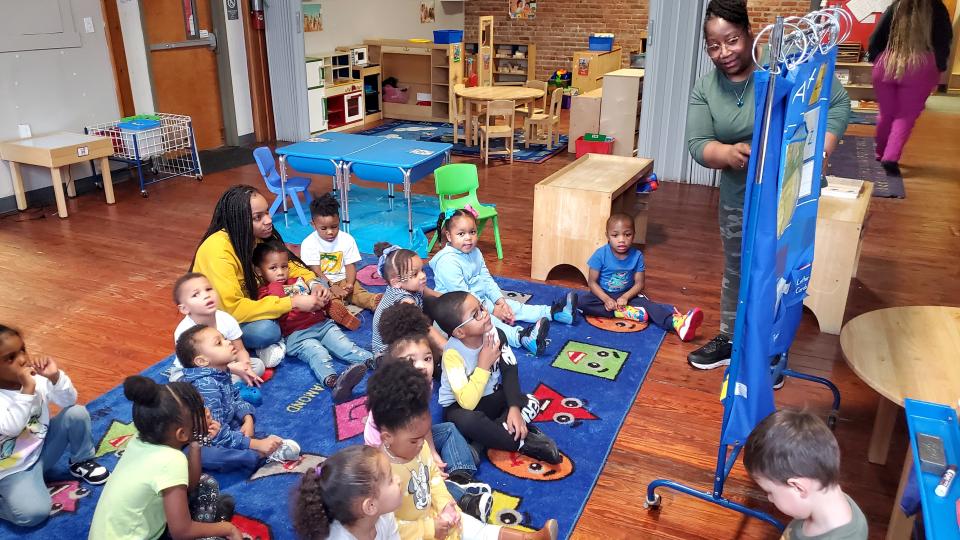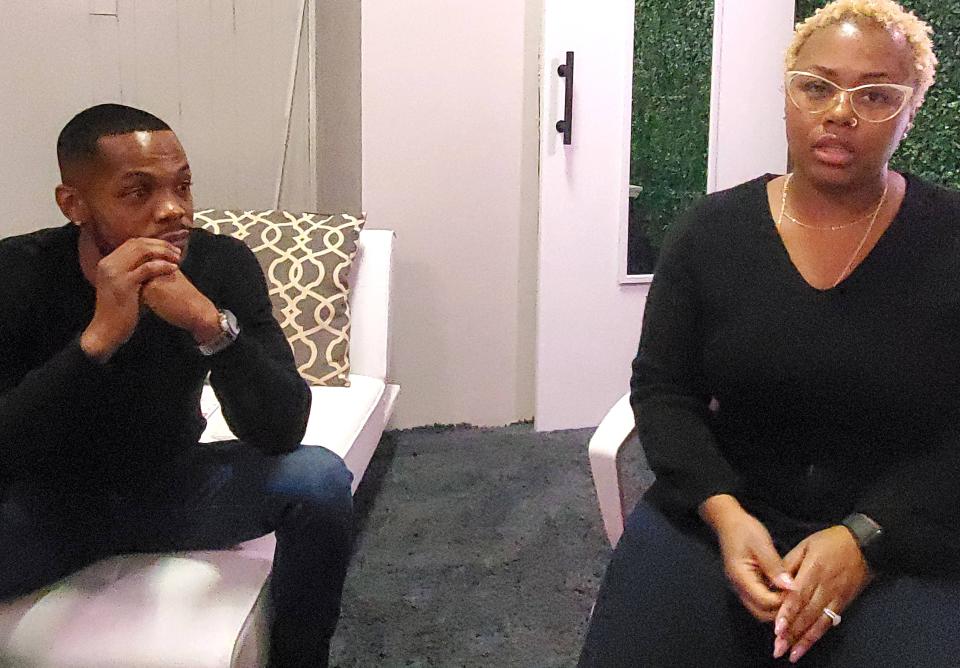To succeed, 'get uncomfortable.' A Black-owned Erie business' advice for entrepreneurs.
Dana Woodson leads a line of little people to the blue carpet in the next room. They plop down, some sitting crisscross applesauce while others extend their legs and point their small shoes toward the ceiling.
They gaze up at Woodson, curious about what they'll do next.
More:A closer look at Erie's child care 'crisis,' and how state officials, others are trying to fix it
Woodson leads the class of 16 3- and 4-year-old students in a singing of the "days of the week" song, then asks them to describe what the weather was like on this Wednesday morning, and finally asks them to count aloud with her the number of boys and girls among the group.
"You're right," Woodson says with glee to the boys and girls. "There are 16 friends today. Sixteen. Woo."
It's a typical morning inside the Learning Ladder Early Child Care Center, 2502 Peach St., a Black-owned business that began taking shape a decade ago in Kenya and Sean Johnson's basement. The couple started the center "out of necessity" in 2013 when Sean, 40, and Kenya, 39, who was in graduate school at the time, were regularly caring for a half-dozen nieces and nephews.

'Very hard days'
Kenya, who was also pregnant at the time, wanted a source of income. Sean, who had been working as a home health aide and who had launched a real estate business with the purchase of his first rental property coming in 2007, pitched the idea of starting her own business.
More:Erie childcare centers share $11.3 million in COVID funding. Find your center on the list
"He had mentioned (the idea) a few times because we knew another childcare provider that had just started," said Kenya, who received a bachelor's degree in psychology in 2005 from Edinboro University of Pennsylvania. "Around that time I went back for my master's and he kept saying, 'why don't you just do child care?'"
"It was not easy, for sure," Sean said. "There were some hard days, very hard days, but I wouldn't change anything about it."
Within two years, Kenya was caring for eight children. It was time to expand. Sean and Kenya began leasing first-floor space at the former concert venue Forward Hall, which at the time was partially occupied by McLane Church.
That's when they took a risk and put faith in themselves: They invested $70,000 to make improvements to a building they didn't own, taking out a second mortgage on their home to do so.

"We used every dime of it," Sean said.
Coming to a crossroads
They started the Learning Ladder, officially, in 2015 with the eight children Kenya was watching at home. Within two months they had 27 kids enrolled. And by the end of the year, the business was at capacity with an enrollment of about 60 kids.
"Kenya really cares about their education, teaching them, and instilling in the kids what we instill in our own children," Sean said.
But then they found themselves at what Sean called a crossroads. The building's owner was anxious to sell, but the couple didn't have the $165,000 to buy it.
Even though Sean had slowly expanded the couple's real estate portfolio — today they own 25 units on 15 properties — they had difficulty acquiring a bank loan. Two local banks denied their applications.
"We had a rude awakening," Sean said. "I had real estate. We had 50, 60 kids enrolled. Kenya was making income and I think two of the local banks denied us. It was at the point where we could have lost our center. We could have truly lost our center. And the little bit of money that we used to remodel in here, the guy could have just took it and sold the building out from under us."
Sean and Kenya Johnson believed they had hit a color barrier with prospective lenders.
"These banks, it isn't black-and-white what they write on these papers. There is a lot of gray," he said. "Whoever's making that decision ... they hold your life in their hands."
That's when Bridgeway Capital stepped in with funding that helped the couple grow their business. Headquartered in Pittsburgh, Bridgeway Capital is a community development financial institution, which, unlike a bank, is a private, nonprofit entity that provides low-interest loans to low-income, low-wealth and other disadvantaged people who otherwise might not qualify for traditional bank loans. It opened its Erie office in 2012.
At the time, Bridgeway Capital was working with two other businesses in the neighborhood, Dapper Don's Styling Lounge and French Maids. The Johnsons worked with then-Erie Region Director T.J. King of Bridgeway Capital.
"It was the best thing that ever happened to us," Sean said. "He worked us through the loan process so easily. We only had to end up putting 5% down on the $165,000 and then he gave us historical credit for the two years that we were paying rent. We only had to come up with maybe like $7,000."
Bridgeway Capital, Sean said, is integral to the Black, Indigenous and People of Color community and anyone struggling to start or grow a business in the area.
Making changes
Most of the children enrolled at the Learning Ladder receive a subsidy for their care through the state's Child Care Works program. Parents pay a small copay. The United Way of Erie County picks up the tab through a scholarship for other children to get care at the Learning Ladder — those who might not otherwise qualify for the state subsidy.
In addition to the pre-kindergarten program for 3- and 4-year-old children, Kenya Johnson also has an after-school program for kids up to age 12. They can work on school assignments inside the facility's classrooms or get exercise in the gymnasium.
In August, however, Kenya made the difficult decision of ending the Learning Ladder's program for toddlers and infants. Kenya said the industrywide shortage of childcare workers, especially through the COVID-19 pandemic, has made it difficult to keep up with the child-to-staff member ratios required by the state for infants and toddlers.
"When I first started I had infants to (age) 12, but infant and toddlers require more staff and they require much more attention," she explained. "I was only operating with just enough staff , and if somebody called off, if somebody needed some time off, then it kind of put us in a bind of ratio issues and not being in compliance with state regulations."
Calculated risks
Sean and Kenya Johnson say they've learned a lot along the way. Here are recommendations that they have for other minority business owners.
"Start with the education side," Sean said. "You have to learn some of these things, whatever field you're trying to be in. If I want to do real estate, I'm going to figure out how these loan officers work. I'm going to figure out how property managers work. I'm going to figure out how accountants work. I don't need to know everything that they need to know, but I need to have an understanding of what they're doing."
People need to "immerse" themselves in whatever field they're trying to break into, he added.
"At the beginning when I started, it was mixed with a little luck, but as we were starting to make income and things started growing, I needed to know how to control this monster that we're creating," he said. "I started to submerge myself in the books and podcasts and anything that I could get my hands on."
Kenya said it's also important to "get uncomfortable."
"I know for me, I was shy, even starting a business," she said. "I didn't like want to talk to the newspaper, didn't want to do interviews. I was very uncomfortable. And I'm still adjusting to that, talking in front of people. I know sometimes people don't want to go into unfamiliar places, but there is always somebody who was better than you, who knows more than you. So if you don't put yourself in those places, you'll be stagnant. You won't grow, so just get uncomfortable."
Sean also said aspiring entrepreneurs need to believe in themselves and take risks.
"It may be more calculated risks," he said, "but believe in yourself and believe in your dream."
Kenya Johnson said she's proud of the quality of care that she and her 11 staff members provide the children. They've received a four-star rating from the state as a result.
"I go by those standards and I go above and beyond," she said. "It's a joy and a rewarding feeling when parents come to me, even when I don't have space, and they say 'can you put me on the waiting list? I'll wait as long as I can to get in.' They always hear good things about us. That fuels my fire."
Matthew Rink can be reached at mrink@timesnews.com or on Twitter at @ETNRink.
This article originally appeared on Erie Times-News: How a Black-owned Erie PA childcare business evolved and succeeded

